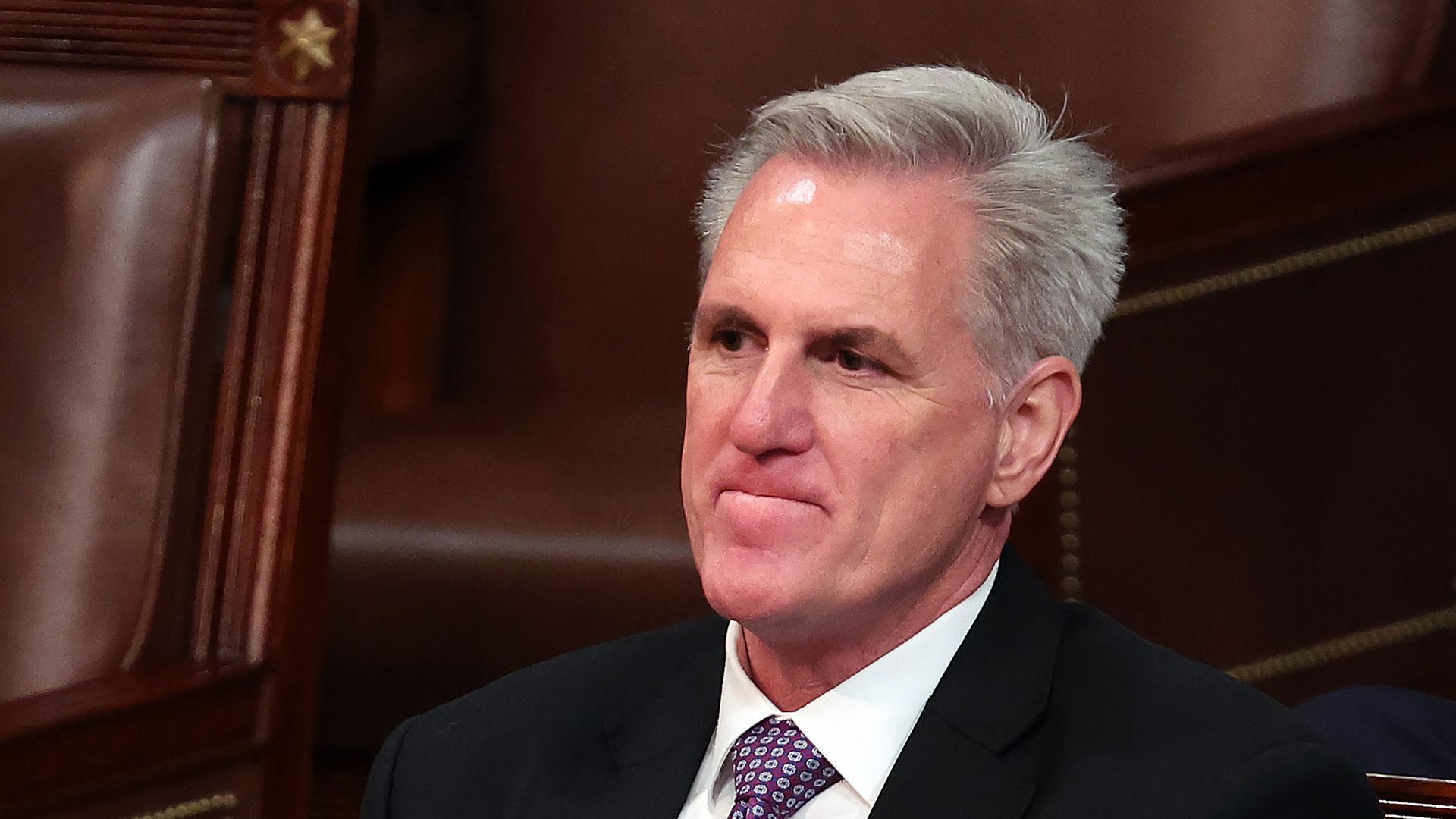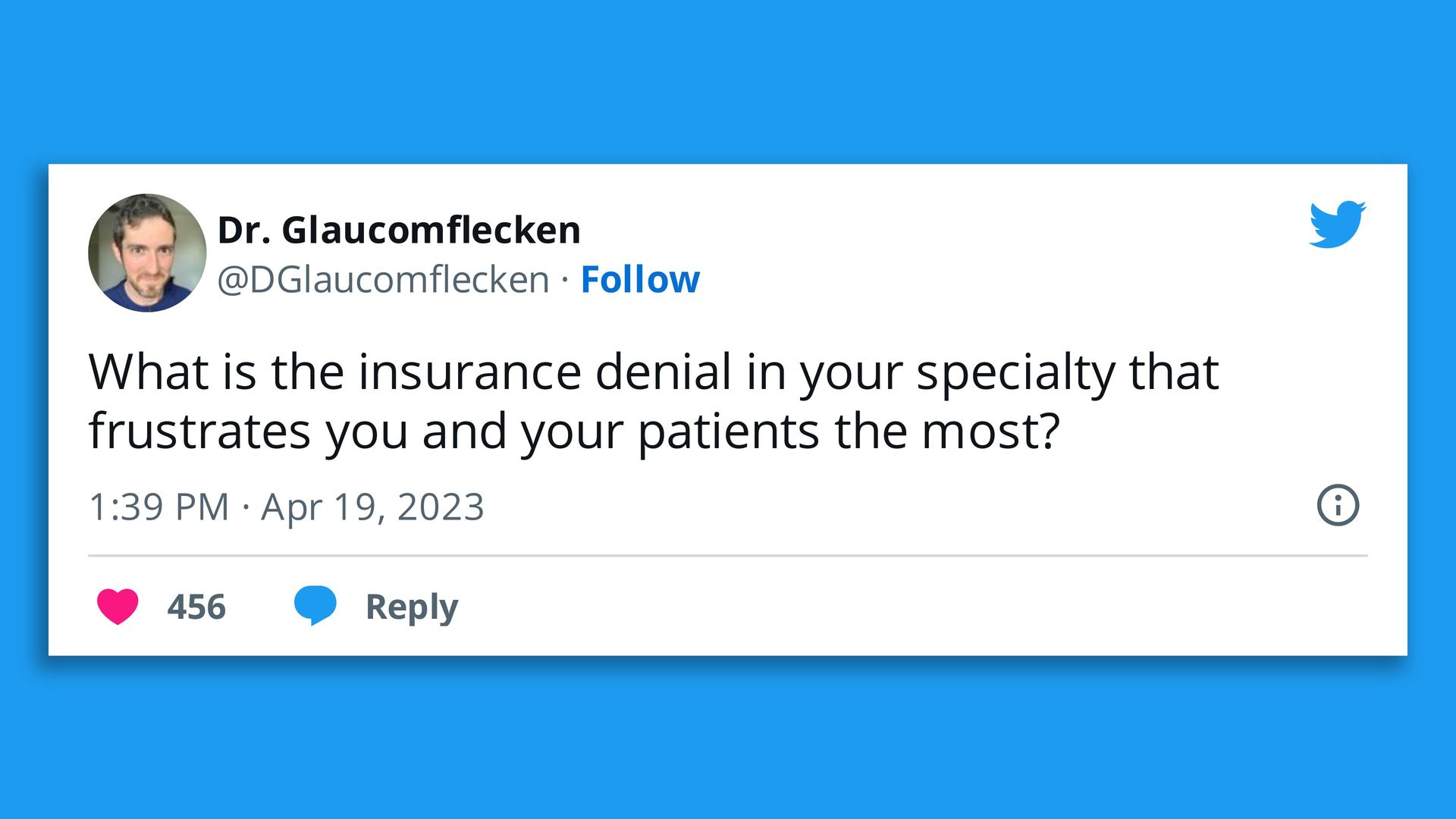| |
| |
| |
| Presented By the Healthcare Distribution Alliance |
| |
| Axios Vitals |
| By Tina Reed · Apr 20, 2023 |
| Good morning, Vitals readers. Today's newsletter is 1,064 words or a 4-minute read. 🚨 Situational awareness: The White House plans to nominate Monica Bertagnolli, who became director of the National Cancer Institute last fall, to become head of the National Institutes of Health, the Washington Post reports. |
| |
| |
| 1 big thing: Biden's next steps on preventive services coverage |
 |
|
| Photo illustration: Shoshana Gordon/Axios. Photo: Alex Wong/Getty Images |
| |
| The Biden administration may be able to ensure continued coverage of free preventive services following a Texas ruling late last month that struck down part of the Affordable Care Act, Axios' Maya Goldman writes. Catch up quick: Last month, a federal judge in Texas ruled employers can't be required to cover specified preventive health care services under the Affordable Care Act. - That includes certain skin and lung cancer screenings, statins for heart disease, medications that prevent HIV, and other services recommended by the U.S. Preventive Services Task Force.
- The Biden administration has appealed the ruling, and it's possible that the Supreme Court may step in and review the case before the end of its current term.
Yes, but: Some legal experts say the statute leaves room for administration officials to step in and fix this on its own. How it works: Three attorneys at Epstein Becker Green wrote in Health Affairs this month that the HHS secretary could authorize the Agency for Health Care Research and Quality to review and adopt the U.S. Preventive Services Task Force's recommendations that the Texas ruling struck. - Administration officials could also put the task force recommendations through notice-and-comment rulemaking, or establish a new HHS agency to provide review and approval of recommendations, the lawyers added.
- HHS could direct the CDC director to step in and oversee the Preventive Services Task Force, too, according to the EBG lawyers.
The other side: Nicholas Bagley and A. Mark Fendrick, two health policy experts and professors at the University of Michigan, wrote a Health Affairs article last month urging Congress to pass new legislation that gives the HHS secretary final authority over which preventive services must be covered free of charge. - "Congress could fix any constitutional defect with the stroke of a pen," the professors wrote.
Go deeper. A version of this story was published first on Axios Pro. Get news like this by subscribing. Use code POLICY100 which gives you $100 off. |
    |
| |
| |
| 2. More states decriminalizing fentanyl test strips |
 |
|
| A fentanyl test strip. Photo: Michael Siluk/UCG/Universal Images Group via Getty Images |
| |
| More red states are moving to decriminalize test strips used to detect fentanyl in illicit or counterfeit drugs as the substance becomes a leading killer of adults under 50, Axios' Sabrina Moreno and Shawna Chen write. Why it matters: The paper strips can reduce fatal overdoses, especially in instances when people unknowingly consume fentanyl-laced pills that look like prescription drugs. Yes, but: Until recently, many states viewed the strips as drug paraphernalia that could embolden people to use substances shown to be free of fentanyl. That stance is at odds with harm reduction advocates, the American Medical Association and the Biden administration. State of play: Governors in 16 states have signed legislation legalizing the strips since January 2022, per the Network for Public Health Law's tracker, bringing the total to 36 plus the District of Columbia. - At least 10 of the 14 states where the strips are still illegal have proposals to change drug paraphernalia laws to exclude the strips. Nearly all are Republican-led.
What they're saying: "If we can just get people to pause long enough to think about what they're ingesting, that's huge," Kentucky state Rep. Kim Moser (R), who led the effort in her state, told Axios. Read the rest. |
    |
| |
| |
| 3. Debt ceiling plan includes Medicaid work rules |
 |
|
| Photo: Win McNamee/Getty Images |
| |
| House Speaker Kevin McCarthy released a long-awaited plan for raising the debt ceiling Wednesday, and it includes Medicaid work requirements, Axios' Peter Sullivan writes. - The measure would require Medicaid recipients to work 80 hours per month. There are a number of exceptions, though, including for people with dependent children, those under age 19 or 56 or over, or individuals enrolled in an educational program.
Republicans argue that work requirements encourage people to get jobs to lift themselves out of poverty. - But a Harvard study about the policy's implementation in Arkansas found no increase in employment and 18,000 people who lost coverage before a judge halted the program.
- In addition, more than 6 out of 10 non-elderly people on Medicaid who weren't eligible because of a disability were already working before the pandemic, per the Kaiser Family Foundation.
The big picture: Democrats strongly oppose Medicaid work requirements, as well as many other non-health care parts of this bill. What we're watching: Whether House Republicans will have the votes to pass it next week, of course — which is far from a given. - The bill also includes the REINS Act, a GOP measure that would require congressional approval of all major regulations — also a sure nonstarter with the White House and the Democratic Senate.
A version of this story was published first on Axios Pro. Get news like this by subscribing. Use code POLICY100 which gives you $100 off. |
    |
| |
| |
| A message from the Healthcare Distribution Alliance |
| $63 billion in savings to the healthcare system |
| |
 |
| |
| Distributors ensure the safe, efficient and reliable delivery of more than 11 million medicines, vaccines and healthcare products every day. Why it's important: By streamlining the supply chain, distributors reduce costs for the healthcare system and ultimately patients. Learn more. |
| |
| |
| 4. Drug pricing rules will likely be challenged |
 |
|
| Illustration: Gabriella Turrisi/Axios |
| |
| Pharmaceutical companies that fought drug pricing reforms Congress passed as part of the Inflation Reduction Act are now weighing a legal challenge as the Biden administration sets about implementing the policy, Axios' Arielle Dreher and Maya write. - "I don't think we've made any decisions at this time, but it's certainly something we're looking into," Lori Reilly, the Pharmaceutical Research and Manufacturers of America's chief operating officer, said during a Wednesday meeting with reporters.
Driving the news: The pharmaceutical industry takes issue with many parts of the proposed negotiation process. - PhRMA, the industry's big Washington trade group, says the Centers for Medicare and Medicaid Services rushed guidance on negotiations out the door. Additionally, the agency should have let stakeholders comment on an already-final section about which medications would be affected.
- PhRMA outlines several other concerns in a 76-page document submitted to regulators, and even argues that elements of the policy would violate the First Amendment if finalized as proposed.
What's next: CMS will announce the first 10 drugs selected for the drug price negotiation program by Sept. 1. |
    |
| |
| |
| 5. Tweet du jour: Now, that's a can of worms |
 |
|
| Screenshot: @DGlaucomflecken (Twitter) |
| |
| Among the answers to this question Wednesday from Twitter-famous ophthalmologist and comedian Dr. Glaucomflecken: "Brain tumor removal." - That was the reply from James "Chip" Wiginton, a surgeon in Southern California.
Among other responses: |
    |
| |
| |
| 6. Catch up quick |
| 📆 Supreme Court extends stay on abortion pill rulings. (Axios) 💰 Malpractice insurance premiums see a big bump. (Modern Healthcare) 👉 Why SUVs are especially dangerous for bicyclists. (Axios) 👀 Long COVID is being erased — again. (The Atlantic) |
    |
| |
| |
| A message from the Healthcare Distribution Alliance |
| Data illumination in healthcare |
| |
 |
| |
| HDA's recent report provides insights on how data can be used in the healthcare supply chain. Why it's important: Illuminating the right data to the right stakeholders inside and outside of government can bolster the integrity and resilience of the supply chain. Read the report. |
| |
| Thanks for reading, and thanks to senior health care editor Adriel Bettelheim and senior copy editor Bryan McBournie for the edits. |
 | | Dive deeper into the future of health care | | |
No comments